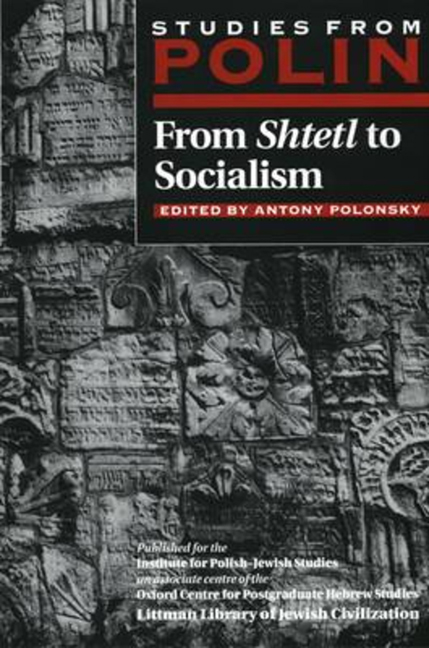Book contents
- Frontmatter
- Dedication
- Editors and Advisers
- Polin
- Polin: Studies in Polish Jewry
- Acknowledgements
- Contents
- List of Maps
- Introduction
- PART I PRE-PARTITION POLAND (to 1795)
- 1 The Reconstruction of Pre-Ashkenazic Jewish Settlements in the Slavic Lands in the Light of Linguistic Sources
- 2 Some Basic Characteristics of the Jewish Experience in Poland
- 3 Images of the Jew in the Polish Commonwealth
- 4 A Minority views the Majority: Jewish Attitudes towards the Polish—Lithuanian Commonwealth and Interaction with Poles
- 5 The Changes in the Attitude of Polish Society toward the Jews in the Eighteenth Century
- 6 A Mobile Class. The Subjective Element in the Social Perception of Jews: The Example of Eighteenth-Century Poland
- PART II THE NINETEENTH CENTURY
- PART III BETWEEN THE TWO WORLD WARS
- PART IV THE SECOND WORLD WAR
- PART V AFTER 1945
- Notes on Contributors
- Chronological Table
- Maps
- Glossary
- Index
3 - Images of the Jew in the Polish Commonwealth
from PART I - PRE-PARTITION POLAND (to 1795)
- Frontmatter
- Dedication
- Editors and Advisers
- Polin
- Polin: Studies in Polish Jewry
- Acknowledgements
- Contents
- List of Maps
- Introduction
- PART I PRE-PARTITION POLAND (to 1795)
- 1 The Reconstruction of Pre-Ashkenazic Jewish Settlements in the Slavic Lands in the Light of Linguistic Sources
- 2 Some Basic Characteristics of the Jewish Experience in Poland
- 3 Images of the Jew in the Polish Commonwealth
- 4 A Minority views the Majority: Jewish Attitudes towards the Polish—Lithuanian Commonwealth and Interaction with Poles
- 5 The Changes in the Attitude of Polish Society toward the Jews in the Eighteenth Century
- 6 A Mobile Class. The Subjective Element in the Social Perception of Jews: The Example of Eighteenth-Century Poland
- PART II THE NINETEENTH CENTURY
- PART III BETWEEN THE TWO WORLD WARS
- PART IV THE SECOND WORLD WAR
- PART V AFTER 1945
- Notes on Contributors
- Chronological Table
- Maps
- Glossary
- Index
Summary
The sources and literature for the theme of this study present particular difficulties. The former consist largely of pamphlets, texts which have to be approached with great care. The same can be said of the literature on the subject, which is often far from objective. With a few commendable exceptions, there is a dearth of studies on attitudes to Jews in the context of attitudes to outsiders in general, although it is clear from many prepartition Polish sources that the commercial activities of Armenians, Scots, Italians and Germans were often criticized in much the same way. Accusations were not only levelled against Judaism, but also against Islam (practised by Tatars settled in the noble Republic) or supporters of the Reformation who, it was claimed, secretly wanted to destroy both human souls and the Republic itself. The writers who made these accusations were often the same people who were offended by every ‘outsider’, that is by anyone different from them in language, traditions or religion. The Jews, although settled in Poland since the Middle Ages, represented a classical and principal example of such an outsider.
It was claimed that Jews, by not eating pork and practising circumsion, ‘in many of their rites resemble the Turks’. They were also said to follow the wishes of the Turks by abducting Christian children and then taking them to the sultan after circumcising them. Although in the first half of the 18th century fear of Turkish invasion had subsided, the accusation that ‘they pass all state secrets to other countries and make pacts with enemies of the Republic …’ continued to be levelled at Jewish society.
The heretic, the Jew, the witch, ali of them, since they had lost contact with God, were considered to be servants of the devil. It is not surprising that there was a proverb that a Jew feared holy water as much as Satan did. It was claimed that all of them used charms, in case of need, to cause personal misfortunes, natural disasters (particularly epidemics), cattle plagues and even Tatar invasions. Gypsies and Tatars who had settled in the Grand Duchy of Lithuania were also accused of practising witchcraft.
- Type
- Chapter
- Information
- From Shtetl to SocialismStudies from Polin, pp. 26 - 38Publisher: Liverpool University PressPrint publication year: 1993



